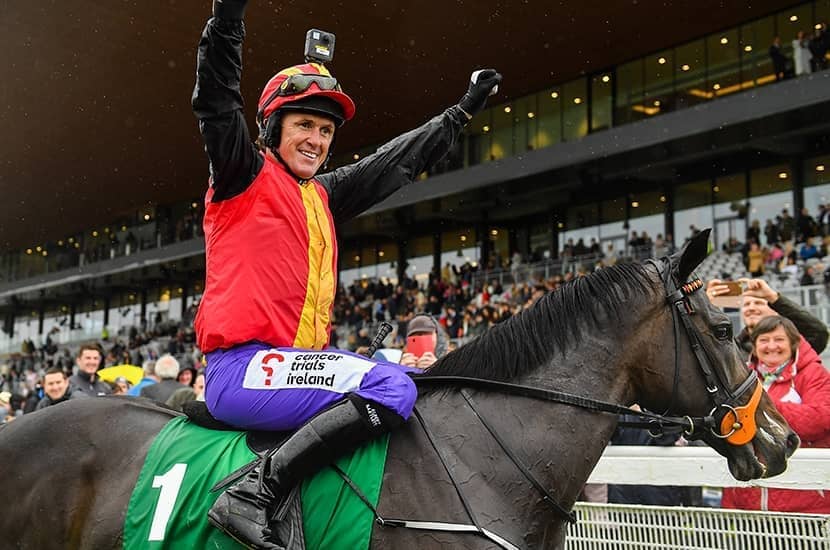In 1986 a young Mark Johnston, having acquired a derelict yard on the Lincolnshire coast, phoned the Jockey Club to enquire about a licence to train. He was asked what experience he had. ‘I’m a vet in practice.’ Back came officialdom’s less than encouraging reply: ‘Just because you’re a vet doesn’t mean you can train a horse.’ So furious was the combative Scot that he almost decided on the spot to go to America to test out his theories.
Fortunately for British racing, he persevered and had the cojones when the Jockey Club grudgingly offered him a jumping licence only to insist that it was a combined licence or nothing. On 23 August 2018, when Frankie Dettori rode Poet’s Society to win a York handicap, Mark’s self-belief was finally and triumphantly vindicated. As his 4,194th success, it made him the most successful British trainer ever. Typically, Frankie suggested that it should gain him a picture on the wall of the Johnstons’ downstairs loo.
After Bryan Marshall came second on another Dorothy Paget horse, she went for him with a shooting stick
It has been a long route from training a handful of horses on a beach adjacent to an RAF bombing range where if a horse got loose the planes would go away and an RAF jeep would help them catch it, not to mention from Johnston’s boyhood in an East Kilbride council house and teenage years training whippets. In 1988 the Johnston team of 13 horses moved to a dilapidated 39-box yard in Middleham, where Mark and his wife, Deirdre, having survived early financial perils that could have bankrupted them, now preside with son Charlie over an equine empire of three yards and a staff of 230 capable of coping with 270 horses.
What some forget is that although Mark has lacked the depth of quality horsepower required to win trainers championships based on prize money collected, he would, if the title went with the number of winners trained, have been champion trainer on at least a dozen occasions. For 27 consecutive seasons he has trained more than 100. The tale has now been splendidly told by Nick Townsend in a new biography appropriately titled Mark Johnston: Phenomenon (Welbeck, £20), which should be a set text for anybody seeking to train racehorses.
Mark doesn’t subscribe to mystique but declares that: ‘Anybody could do this job. It’s not rocket science.’ Having started out thinking the key would be feeding his horses more and working them harder, he is now amazed how little work a fit horse can get away with: ‘There is a balancing act between fitness and freshness. You have to walk that tightrope.’ He scorns those who say they are happy to settle for 70 horses. ‘They only say that because they can’t get any more,’ he says, insisting that to train Classic winners you need at least 150.
The ultimate realist, he argues that stable heroes like Double Trigger have won races not through ‘fighting spirit’ but through superior stamina. Famous for his bargain buys (his 2000 Classic winner Mister Baileys cost only 10,500 guineas), he warns: ‘If I haven’t picked a horse on pedigree I won’t look at it. If you go and buy horses cheaply on how they look you’ll buy an awful lot of slow horses.’ And since British racing is run not for the paltry prize money but for resale value, he advises owners that whenever they are offered what a horse could be worth after its next run, ‘Then you have to take it.’ I can only say: read Mark, learn and inwardly digest.
The other volume this year worth space in any racing library is Neil Clark’s Champion Jump Horse Racing Jockeys (White Owl, £25 ), which tells the stories of the 22 champions from Fred Rimell to Dan Skelton. The title race lately has been dominated by two men: Sir Anthony ‘AP’ McCoy (20 consecutive wins from 1995 to 1996) and Richard Johnson (16 times runner-up to McCoy before winning four titles himself between 2015 and 2019). Other multiple winners include such greats as Peter Scudamore, John Francome and Richard Dunwoody and racing anoraks will be grateful for Neil’s blow-by-blow recording of their leadership battles.
More fun though is his keen eye for anecdote and this book’s richest pleasures are found in the tales of part-forgotten heroes like 1946/47 champion Jack Dowdeswell, who had a stripe taken off him in the Royal Horse Artillery for ducking off to ride a Cheltenham winner. As an apprentice he earned two shillings a week, slaving 14 hours a day for the tartar Ted Gwilt. Bryan Marshall had the mixed fortune of riding for Dorothy Paget, who berated him at Folkestone one day after he had ridden her five winners but come second on the sixth. After another second on a Paget horse she went for him with a shooting stick.
The mild-mannered Dick Francis turned up one day to be interviewed by grandee trainer Peter Cazalet. A new would-be parish vicar was due the same day and a puzzled Francis was at first taken for the churchman. Saints and sinners, then — but heroes all.






Comments